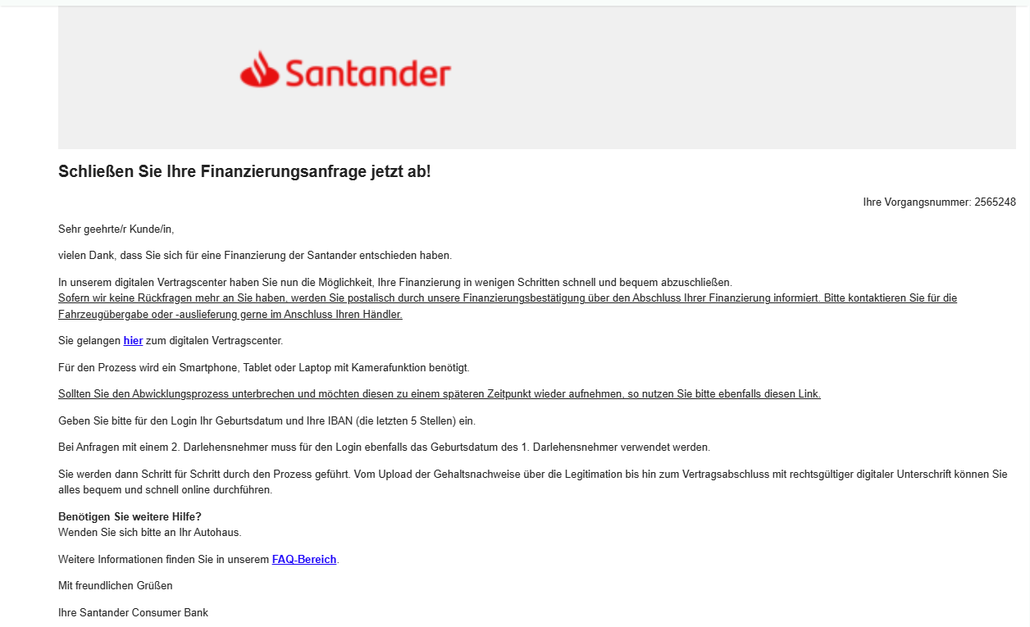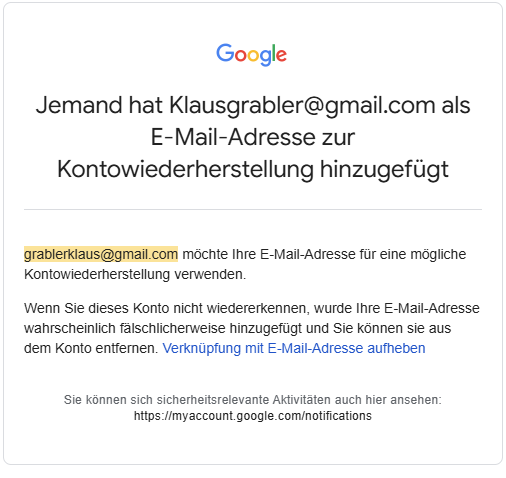"I have your address. I have your passport. I have everything of you. If you dare write any fairytales about me I will find out about it and you will pay. There are people who would want to make you pay for what you did to me. Believe me."
L.O.(The terrified 'Victim')
What happens when respected businesses quietly enable identity fraud—then ignore the victim who proves it?
A Pattern of Evasion, Not Just an Error
In November 2024, during a coordinated cyberattack, I received a Google security alert that someone had attempted to make my email address the recovery address for an account under a name that was a reversion of mine. grablerklaus@gmail.com . The recovery attempt was blocked, but the timing indicated more than a random error. I sent multiple emails to the address associated with the attempt, seeking clarification. Not a single reply was ever received.
Segmüller and the Case of the Phantom Furniture
Four months later, in March 2025, I received an unexpected notification from the German furniture company Segmüller: my order, paid in full, was ready for collection. But I had never placed this order. Still, my full name and my real email address were used on the receipt.
There was also a landline number listed for delivery. I called it, posing as a representative of the furniture company. The man who answered identified himself with my full name, as Klaus Grabler, and when asked to confirm his email address, he gave grablerklaus@gmail.com, the exact same email that had earlier attempted to hijack my google account. When I began questioning him about this, he hung up the phone. I emailed him again, repeatedly but never received any reply. I emailed Segmüller, explaining what had just occurred. In due course they responded saying that the client had assured them it was “just a mistake.”
But that is not possible. Their registration form requires customers to enter their email address twice. The chance of this being an honest error is effectively zero. I followed up again, as this seemed an obvious excuse. No reply.I sent a second, then a third, clearly written, polite email. I received no response whatsoever.
And yet I could see, via a professional tracking system, that each email was opened, sometimes multiple times. The company simply chose not to answer.
A Familiar Silence from Oswald Auto and Santander
By July 2025, the pattern had expanded. I received a message that my application for vehicle financing at Oswald Auto had been approved by Santander Consumer Bank. Once again, I had not applied. Once again, my surname and email was used by the same individual. And once again, the application appeared to originate from Germany. I sent formal emails to both companies explaining my prior experience and raising my concern that someone was abusing my identity.

This time, Oswald Auto GMBH replied. But I was quickly disappointed. They wrote back only to inform me that they had spoken to the client, and that he had explained it was just another mistake. Apparently he had given them an old email that happened to be my current one. (I have had my email or 14 years and Google does not allow deleted email addresses to be reused.) No acknowledgment of the earlier fraud attempt. No expression of concern. No contact from Oswald Auto at all.
Again, I could see that my emails were opened. But no one responded. Not Segmüller. Not Santander. Not Oswald Auto. And certainly not the man named Klaus Grabler or Nikolaus Grabler and who was using my email address! I know for a fact that everyone involved had read my emails and just chose not to respond to them. That is the state of their concern.
Why This Matters—And Why I’m Making It Public
What began as a cyberattack escalated into a full-blown impersonation scheme involving:
-
Attempted hijacking of my Google Gmail account
-
Use of my name and email on an expensive furniture order
-
A fraudulent application for vehicle financing again using my name and email
-
A man who knew I was questioning his actions yet who refused to speak to me while having no problem telling the companies it was just a mistake.
And yet, when I attempted to bring this to the attention of the companies involved, I was met not with investigation or reassurance, but with silence. They read my messages. They know the facts. But they choose not to engage.
For the Record
For context, I have owned my email address, klausgrabler@gmail.com for over 14 years. It is publicly tied to my name, platforms, and creative work. This is not a new or obscure contact point. The idea that two separate transactions months apart, could both “accidentally” enter my exact address strains credulity beyond reason.
The Ethics of Inaction
Segmüller, Oswald Auto, and Santander are not merely bystanders in this. By ignoring evidence of active identity abuse, by refusing to even acknowledge further communication from the individual whose identity is being used, they are now possibly complicit in protecting the offender.
These companies have a social, legal, and ethical responsibility to respond. Not just to me, but to the truth. It is not enough to claim internal verification if the actual victim is locked out of the conversation. It is not enough to say "The client says it was a mistake," when that client is possibly not even the person being impersonated. When companies ignore legitimate reports of fraud, they do more than turn a blind eye, they become enablers.
To Those Reading from Segmüller, Oswald Auto, or Santander:
This page is now public. You are reading a clear, evidence-backed account of what occurred. You have received my emails. You know who I am. And now, so does the public. You may still choose to respond. If you wish to issue a statement or open dialogue, I am available at klausgrabler@gmail.com. If you continue to remain silent, this page will remain, a silent testimony to your inaction.



